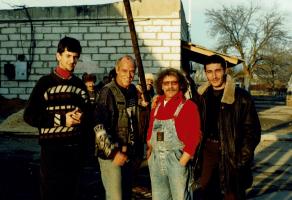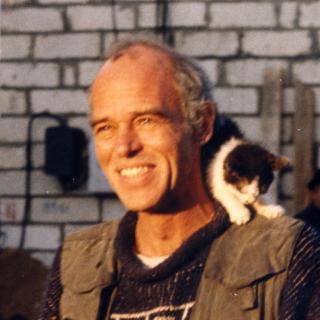Hans Elkerbout was born in Sukabumi, Indonesia, on 4 January 1949. After finishing school in the Netherlands, he went to Utrecht University where he gained a master’s degree in psychology in 1976. He then worked as a university researcher until 1980, when he switched focus, joining Amnesty International as a construction manager. He spent the next five years with the human rights organization, completing several construction and civil engineering courses during his time there. After this he worked independently on construction projects around the world: the Netherlands, Spain, Turkey, Afghanistan, Pakistan and lran. In 1995 he joined Médecins Sans Frontières, managing the construction of a hospital in Albania.
Hans was an all-rounder when it came to construction. He could oversee – as well as turn his hand to – all aspects of a project: building, plumbing and electrics. In addition, he was calm, loyal and kind – someone who always put others first. He rejected violence and loved nature and animals, preferring nothing better than a walk through a forest or along a sun-kissed beach, lost in his thoughts. In May 1996 Hans completed his basic training with the Netherlands Red Cross and was seconded to the ICRC. He was assigned for three months to the Nalchik office in the Russian republic of Kabardino-Balkaria. After arriving in mid-October, he was posted to the neighbouring Russian republic of Chechnya where the main hospitals and other health facilities in the capital Grozny had been badly damaged during fighting. Hans’s job was to oversee repairs to one of the hospitals, a blood transfusion centre and a prosthetic workshop. As always, he settled quickly into his work, fully focused on what needed to be done.
During his time in Chechnya, he was based in the village of Novye Atagi, some 20 kilometres south-west of Grozny. The ICRC had opened a field hospital there in September. In the early hours of 17 December 1996, six ICRC delegates, including 47-year-old Hans, were shot dead as they slept in the ICRC residence next to the field hospital. Like Hans, four other murdered delegates had been seconded to the ICRC by National Red Cross Societies: Ingebørg Foss, 42, and Gunnhild Myklebust, 50, both nurses with the Norwegian Red Cross; Nancy Malloy, 51, a medical administrator with the Canadian Red Cross; and Sheryl Thayer, 40, a nurse with the New Zealand Red Cross. The sixth delegate was head nurse Fernanda Calado, 49, from Spain, who had worked for many years with the ICRC. Another delegate, Christophe Hensch, a Swiss national in charge of the ICRC's Novye Atagi office, was shot and survived.
Jean de Courten, the ICRC’s director of operations, called the attack a cowardly, “deliberate assassination”. No one has ever claimed responsibility. Following the tragedy, the ICRC evacuated its remaining 14 delegates from Novye Atagi to Nalchik. Local medical staff continued to care for patients at the hospital. Speaking at a memorial ceremony at Saint-Pierre Cathedral, Geneva, just days after the attack, ICRC President Cornelio Sommaruga said: “All six were dedicated to the ideal of solidarity with the victims of the Chechen conflict. They were fulfilling with exemplary enthusiasm the original mission of the Red Cross – to care for wounded – and they were doing it in the same spirit as the women of Solferino: ‘Tutti fratelli’ [We are all brothers].”
Hans was a gentle soul who was committed to the possibility of a better world, one free of cruelty and suffering. A world reflective of the tranquil natural landscapes where he so often found peace.

